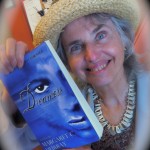
Here I am at my son’s wedding, sitting at a table, listening to a friend across a centerpiece of lovely flowers review my book. “I don’t understand why Annie keeps coming back!” my friend says, gesturing for emphasis across the round table set with white china and brilliant bouquets–my favorite flowers, I muse. She’s an inveterate reader and we haven’t seen each other in months.
“Why does Annie keep coming back?” my friend keeps asking. She’s referring to the main character in my newly published novel, Dreamers, a coming of age love story of the ’60s. Annie’s a white girl who falls in love with Thomas, a black actor. It’s the height of the Civil Rights movement and they’re both in the wrong place at the wrong time.
I can think of many reasons of why Annie keeps coming back, but what does it matter if my friend doesn’t see them? The truth is I’m thrilled Dreamers is having such a powerful effect on her.
How wonderful that I get to acknowledge my characters at my son’s wedding! What an opportunity to hear her feedback. I gaze at the scarlet flowers in front of me thinking how fortunate I am to have such a discriminating, exceptional friend who loves to read. How real the story is for her! How deep her involvement is with the character of Annie! She understands how attractive Thomas must appear to Annie she says, but still–here’s the reality test–she herself would never stick around like that. I gaze at a single perfect petal before me and nod, recalling how my book begins with Annie reflecting, “I was in love with trouble.”
“I would love it if you’d write a review of Dreamers on Amazon or Goodreads or on my website,” I say. “Would you be willing to do that?” She agrees.
Later I think about our conversation. I ask myself if I really want her to write a review. After all, what she’s saying about Annie isn’t that positive. It’s not that good in fact. It could be a big flaw in the book. I might end up with a bad review.
Then I think of another book I have at home on my table. Last fall the author asked me to write a review of it and I readily agreed. For one thing, he had just bought my first novel, Sundagger.net, at a booksellers’ show we were both attending. I was very grateful. Plus I wanted to help out another small publisher and novelist like myself. But most of all I was excited at the thought of reading his coming of age story of the ’50s.
But I haven’t written the review. I wish he had given me his second to the last draft. As it stands, in my view, his published story cries out for attention, his dialog for editing, his characters for focus and direction. I’m not the person to criticize that publicly.

Every author knows what I’m talking about. Take the novel draft I am working on now, Spiral, a prequel to Sundagger.net. In Spiral, the characters from Sundagger.net live out their karma of years before. Daily I struggle with my many dubious, rock-hard sentences. Like weeds, I keep pulling them out and digging deeper for new ideas, scenes, and characters–in short, story-building words. How slowly they emerge from the grit and grind of my mind. But sooner or later the book begins to grow and bloom.
I glance across the room at tables covered with all those fragrant bouquets. Yes, I do hope my friend reviews Dreamers. Be rigorous I want to say. True, writing is a delicate matter, like flowers. So are writers. But still, the only review any author wants and needs is a good one, the one that makes the next book better.
Some Recent Reviews I Wrote:
Blood River, A Journey to Africa’s Broken Heart, by Tim Butcher
Someone Knows My Name, by Lawrence Hill
Sinister Pig, by Tony Hillerman

